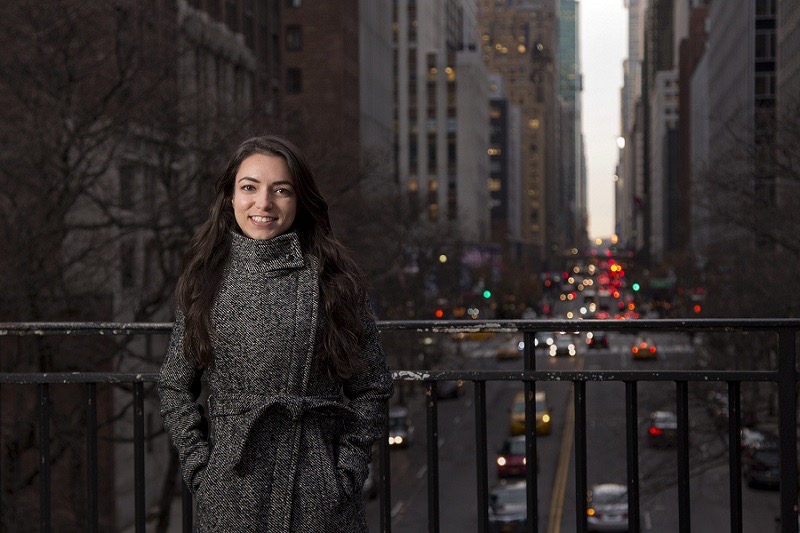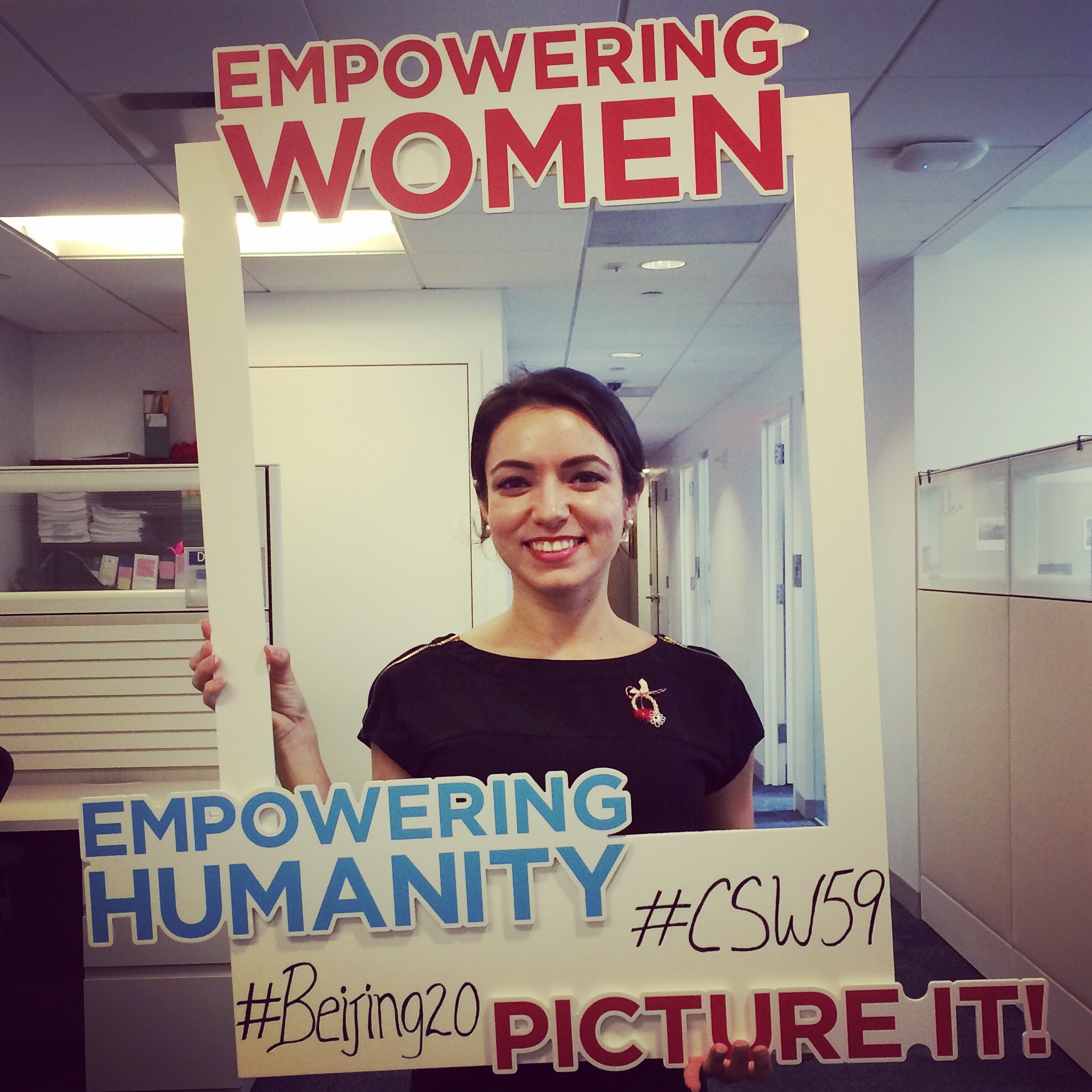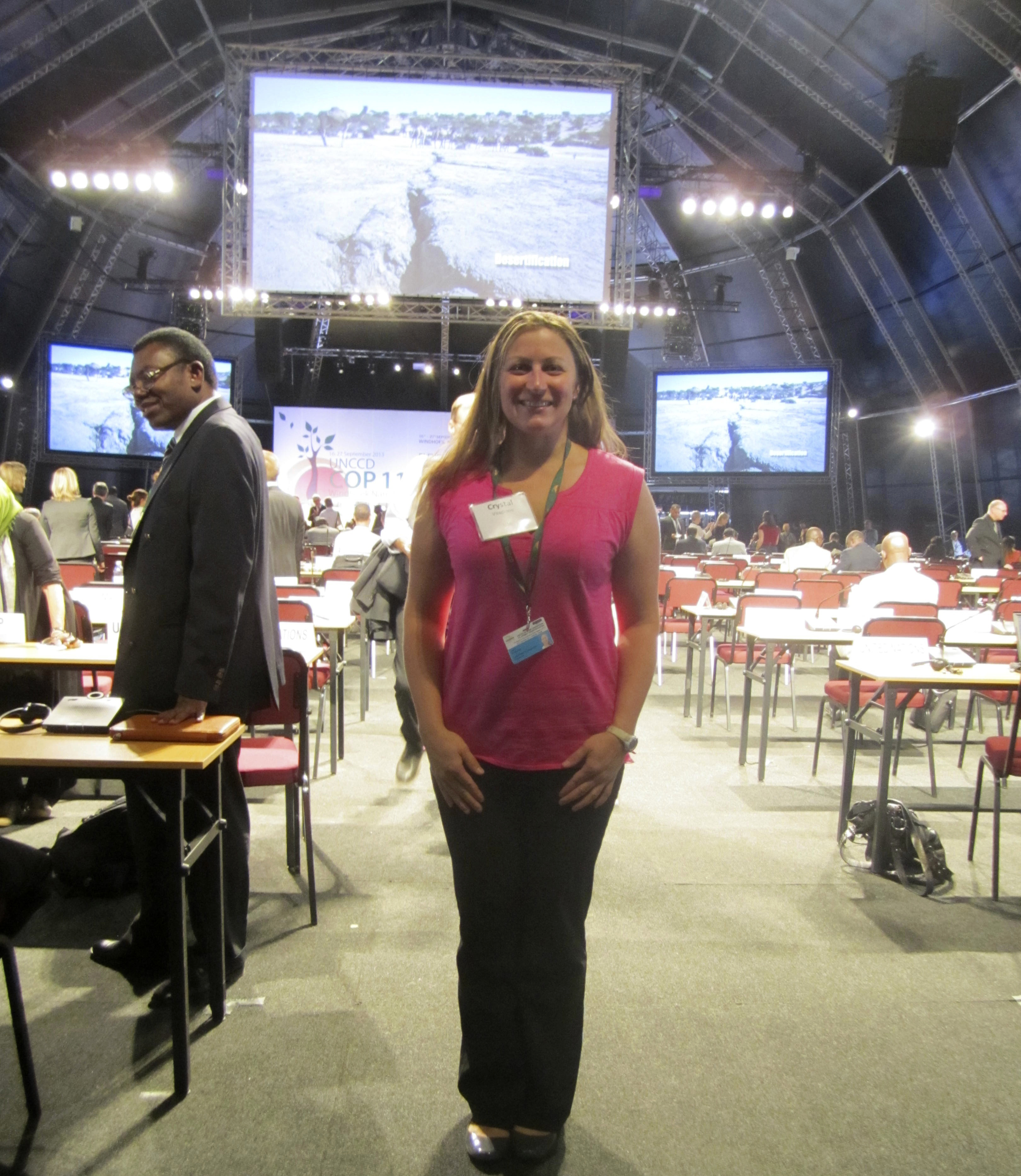by Bethany Romano

Heller SID student Wendy Gutierrez, MA-SID '15, during her practicum at the United Nations headquarters in New York City. Gutierrez has accepted a full time position with UN Women in their department of communications and advocacy. Photo Credit: Ryan Brown.
For many of the students enrolled in Heller’s MA in Sustainable International Development (SID) program, working at the United Nations is the ultimate goal. “Since the formation of UN Women in 2010, I knew I wanted to work with them,” says student Wendy Gutierrez, MA-SID '15. “I always followed UN Women's advocacy campaigns and thought it would be a great opportunity to be able to work in the communications and advocacy aspect of development.”
With their joint focus on global development theory and practical application, SID students like Gutierrez are ideally positioned to contribute to the United Nations’ efforts. “The issue of sustainability is what everyone is concerned about, at the U.N. and in the development field generally, which makes Heller SID students a great fit because they get exposure to the theory and the practical applications,” says Elizabeth Walsh, MA-SID '09, who coordinates the SID practicum and is herself an SID alumna. Over 60 Heller SID students have completed their practicum at the U.N. in just the last 10 years, and several of them subsequently secured full-time employment there after graduating. These alumni currently work on U.N. initiatives to alleviate poverty, improve public health, treat and prevent HIV/AIDS and promote gender equity, among others.

Wendy Gutierrez during the 58th Session of the United Nations Commission on the Status of Women.
Gutierrez’s aspirations became a reality when she secured a practicum placement with the advocacy and communications team at UN Women for the 2014-2015 academic year. “It was a challenging but extremely rewarding experience to be able to support the communications team at different levels and really help spread UN Women’s message and mission to bring gender equality to the forefront of every conversation,” says Gutierrez, who just completed her practicum.
One of Gutierrez’s former classmates, Crystal Vitagliano, MA-SID '14, agrees. “I always saw the U.N. as being on the front lines in terms of helping with global crises and helping those living in extreme poverty, and I wanted to be a part of that.” Vitagliano secured a practicum placement at the United Nations Development Programme (UNDP) in 2013-14 with the Equator Initiative, where she interned for seven months. During that time, Vitagliano helped to coordinate the United Nations Convention to Combat Desertification in Namibia, compiled best practices for Small Island Development States under the Global Island Partnership and disseminated the call for nominations for the 2014 Equator Prize. “We received over 1200 nominations from 121 countries, which was a record,” she says, noting that many countries that had not been Equator Prize winners in the past were recognized for their sustainability efforts.

Crystal Vitagliano at the United Nations Convention to Combat Desertification (UNCCD) in Windhoek, Namibia. “We worked with representatives from local community initiatives across the globe to help them present their projects, best practices and lessons learned to various UNCCD audiences.”
The Heller SID practicum is an optional fieldwork experience for second year SID students which requires them to secure full-time work on a development issue or problem in a recognized development organization for a minimum of six months (see the map below for a selection of SID practicum placements). While hundreds of organizations have accepted practicum students since the program’s inception in 1994, cultivating relationships with internationally recognized development organizations such as the U.N., Oxfam and Catholic Relief Services has been a priority. Even though Heller students have done their practicum at various branches of the U.N. for years, two years ago Heller developed a formal relationship with field advisors at UNDP.
Under this new agreement, the UNDP identifies and holds roughly six practicum slots each year for Heller SID students to work on pre-identified projects. Every spring, the Career Development Center and Elizabeth Walsh manage a competitive application process to place first-year SID students in those prominent positions. The Career Development Center also oversees an annual student-organized trip to the U.N. headquarters in New York City. The 2015 New York trip included panel discussions with Heller alumni now employed at the U.N. and SID students currently conducting their practicum there, as well as other industry professionals.

Vitagliano was pivotal in creating this new Heller/UNDP arrangement, noting that these kinds of partnerships “not only develop further incentive for incoming students to choose the Heller School, but also help alleviate the practicum search process a little and create strong connections for Heller students in the future.” She notes that students shouldn’t expect to have a practicum handed to them, however. “It’s important for students to go through the process and the struggle to find a practicum organization because I think that is how a student will determine what they want out of their practicum. If they were just to choose from a menu of available organizations, it would be less meaningful.”
Some students enter the SID program already having identified a small non-profit where they want to conduct their practicum. For others, finances present a more salient concern—the UNDP practicum, like many internships, is unpaid—and New York is an expensive city to live in.
Fortunately for Gutierrez, her practicum at UN Women in New York City resulted in a job offer (which she has accepted) in the organization’s office of advocacy and communications. She attributes her success at UN Women to the diverse skills she gained in the Heller SID program, saying “it exposed me to some of the more technical aspects, such as the process of planning and implementing a project, and it taught me to think critically about issues concerning gender.”
After her graduation in May 2014, Vitagliano took a policy analyst position at the Environmental Protection Agency (EPA) in Washington, DC. Like Gutierrez, she notes that Heller “helped show me what real international development work really looked like,” an opportunity that, thanks to Heller’s new partnership with UNDP, will be afforded to more students annually than ever before.
